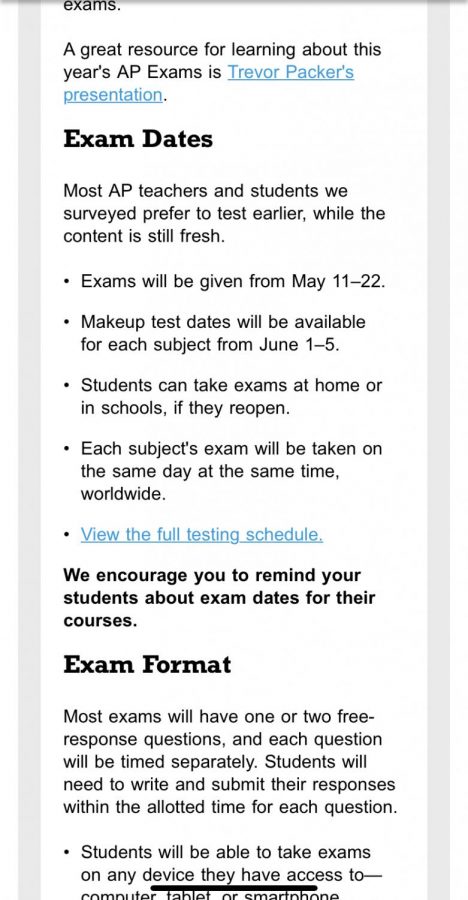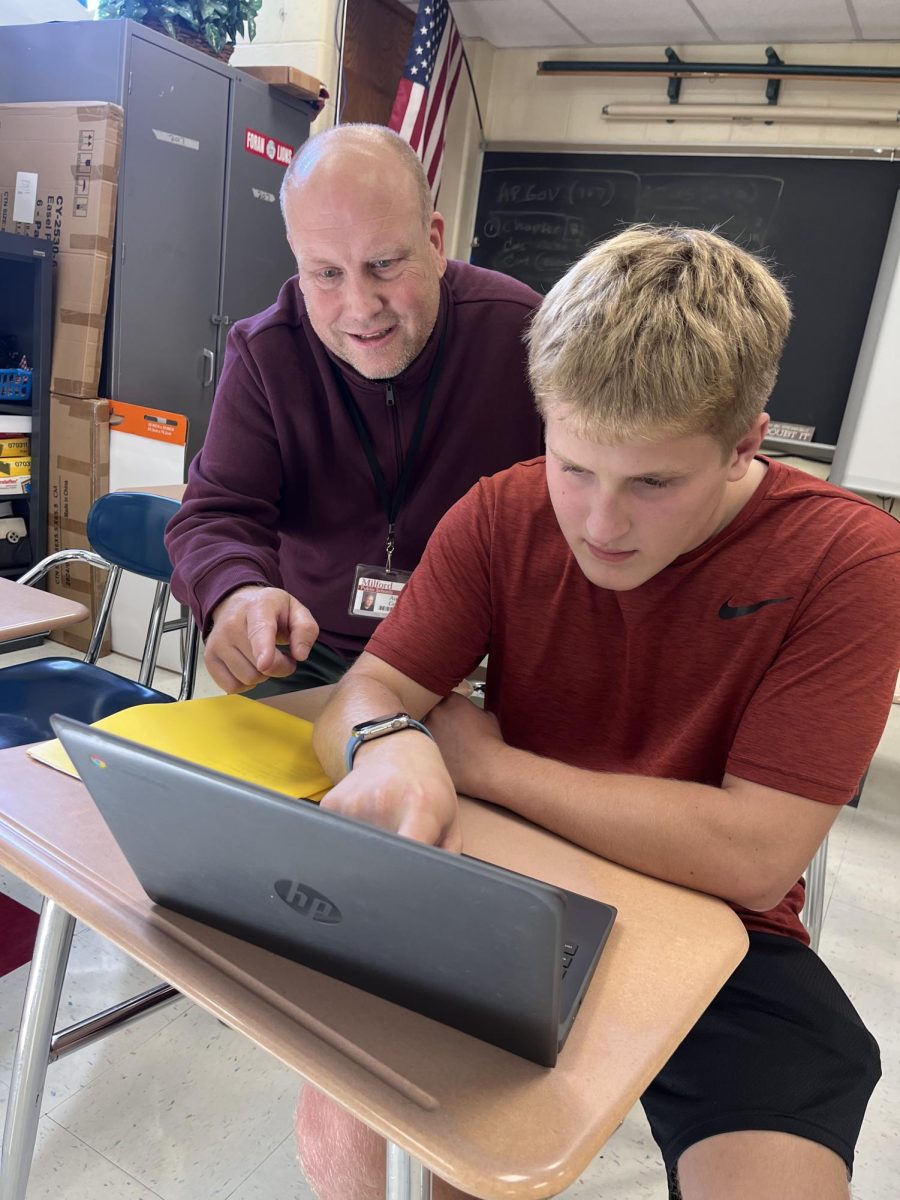Perspectives on the Sudden and Drastic Change of AP Tests : Coronavirus 2019 Pandemic
Photo courtesy, collegeboard.org. The College Board is providing students with YouTube live streams, by certified AP teachers, to prepare for the new tests and go over content.
April 3, 2020
Kensye Cocchia
Staff Writer
There is currently a lot of uncertainty in the United States and globally due to the coronavirus, also known as COVID19. Due to the prohibiting of students attending school as part of the government’s attempt to slow the spread of the infectious disease, AP testing opportunities have quickly become a major concern.
AP high school students and teachers spend hours preparing, completing assignments, studying, and stressing over the College Board’s AP testing in May. Students who take multiple AP classes became frantic when school was canceled until further notice, due to the concern of how they will complete their tests for college credit.
The College Board conducted a survey saying, out of 18,000 AP students 91% said they still wanted to take the test despite odds caused by coronavirus. The College Board made the executive decision to move AP tests to an online 45-minute free-response exam that will be taken at home versus in school. The exams will have software to prevent cheating and will be available to be submitted via writing on paper in case of technical difficulties or if a student does not have access to the internet.
This is an uncommon change instructed by the College Board since previous tests could have lasted hours.
Some students are not happy about the change. Junior Ben Carlson, who takes AP Chemistry, AP Computer Science Principles, AP Language and Composition, AP European History, and AP United States History says he is angry about the change because he believes, ¨[the College Board] should have just canceled the tests because they aren’t true representations of the students [abilities].¨
Junior Shea Carroll who takes AP Language and Composition, AP Physics, and AP European History says, ¨I’m not happy with the change because [the old tests are] what we’ve been preparing for all year, but I understand why it had to be done.¨
Some believe the College Board should have kept the test the same style instead of changing the entire exam, which causes disadvantages to students who now need to study for a brand new exam. Students are obligated to take exams at home either way.
Some seniors are satisfied with the change. Senior Brianna Aguilar, who takes AP Biology, AP European History, AP Calculus BC, AP Statistics, and AP Literature says, ¨These AP tests don’t matter that much to me because I don’t think my college will give me credit. They still affect many people though.¨ Aguiliar will be attending the University of Pennsylvania in the fall, which accepts few AP credits.
The individuals teaching the exams are also under a deal of stress due to the task of preparing their students for success.
AP language and composition and the AP literature teacher, Ms. Love says, ¨It is a bit overwhelming as a teacher to have the exam change so close to the exam[date], and I know my students are equally frustrated and concerned. However, I know that the College Board is doing what’s best for the students based on the circumstances. I think what most people were/are feeling is the fear of the unknown. We have spent months preparing for an exam and not knowing the full extent of the changes is what was concerning. As more information has been released by the College Board regarding the exams, I have felt more comfortable with the test changes.¨
A lot of teachers are viewing the positive side of the current situation. AP European History and AP Government and politics teacher, Mr. Tupka says, ¨I am glad that the College Board is going to continue the exams. Students who have been working all year towards an exam should not have the opportunity to get college credit taken from them with just 45 days left [until exam days]. Regardless, all AP teachers are trying to learn every detail of the format to prepare students. Students and teachers are in this together as we assess what all of these changes mean.¨
With the change comes concerns of students cheating, even with software installed to prevent it. This can cause students to take away scores another student deserves that did not cheat. In a school setting teachers were able to monitor students while taking the paper exams. Now they are online and taking place at home without teacher supervision.
Aguilar says, ¨I think students will cheat. Even with the lockdown mode installed into our Chromebooks, we still have access to our notes, prep books, phones, friends, and other laptops.¨
Carroll says, ¨I do think students will cheat because all the classes are very challenging with lots of content to know and if students are unsupervised and taking it at home with textbooks, notes, and electronics, then it would be easy to cheat.¨
Carlson agrees, saying, ¨I do think students will cheat out of pressure to get a high score.¨ A higher score helps during the college process, a crucial, intense, and competitive time for upperclassmen.
The change creates a lot of uncertainty and may cause students to feel unprepared for the shortened exam since they are unclear about the style of their prompts and what material it will cover. No teachers have answers either, only what the College Board has released.
Carroll says, ¨I don’t feel 100% prepared for the test because this has never happened before so it is new for everyone but I think we will all still do well because our teachers are working to help us cover everything we need to know before we take our exams.¨
Aguilar says, “All of the content of my exams were cut short. So we’ve already learned most of what we need, which makes me feel more prepared in away. However, I’m more nervous for them because I think if we want to get a good score we need to essentially master the content. We have fewer opportunities to display the information we actually know to make up for the stuff we don’t.”
Teachers deal with the task of preparing students for the exams once the College Board notifies them about the content.
Love says, ¨Because the AP English Language and Literature courses are skills-based and not content-based, I do think my students are prepared. Luckily, my classes have covered all of the skills that will be assessed on the exam, so they are already prepared for the new format.¨
Some teachers have not covered all the topics due to the lesson plans needing the entire school year, until exams, in order to prepare.
Tupka says, ̈I would prefer the older style exam as that is what we have been preparing for, but if our choice is this or no exam, I will take this.¨
The multiple-choice option was deleted from all tests, which causes anxiety for students and creates a disadvantage of representing all knowledge.
Carlson says, ¨I feel prepared but I am unsure of the material.¨
With the change, some students prefer the original exam because it is routine for many and covers many topics of each course.
Aguilar says, ¨I prefer the original just because it’s what I’ve grown used to. It also seems unlikely that an exam that’s 45 minutes long will accurately assess what we have spent months learning.¨
Carroll says, ¨I like that it is shorter but I don’t feel like we are accurately assessed on everything we’ve put so much time into all year in just 45 minutes so I wish it was longer than that.¨
Carlson says, ¨I prefer the old style of the test because the questions were weighted less and it had a more even curve.¨
While some students approve of the decision made by the College Board, others do not.
Aguilar says, ¨College Board made the right decisions for themselves. They are still earning money from this, but are protecting their reputation by making the tests seem easier for students. I think they are taking advantage of students during this crisis. We are already at an extreme disadvantage because we don’t have in-classroom learning. Students have increased responsibilities at home and cannot be expected to effectively learn the same way we would at school. Personally, for myself, my mom can’t work at home, but I can. I’m working more than I usually did when school was in session so I have less time to study, learn, and do my homework.¨
Carroll says, ¨I think the College Board did what they thought was best but I don’t agree with their decision to completely eliminate all multiple choice questions on all the exams because FRQs are generally harder. For example, AP Physics has multi-step problems for FRQs and if we only have 45 minutes it might be more rushed or more difficult for students to perform well on that exam, especially if we’ve been practicing both all year.¨
According to school counselor, Mr. Jake Rosengrant, “ I’ve had to keep a close eye on the situation being the AP Coordinator for our school and in all of the communication I’ve received, College Board has done a really thorough job reaching out to AP students and families to understand what they need and what they want from this unprecedented situation. In their communications, the College Board stated that a really high percentage of AP students polled, I believe over 90%, said they wanted an opportunity to follow through with the end of year exam. It obviously looks different than in years past, but every stakeholder involved in AP exams, colleges included, understand this is not typical and will take everything into consideration. With everything going on, I believe this is the College Board making the best of an unfortunate situation.”
There are many different attitudes and perspectives on the change by the College Board but little anybody can do to solve all obstacles due to the restrictions and uncertainty of the coronavirus.








